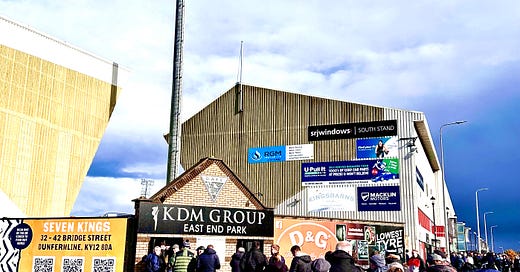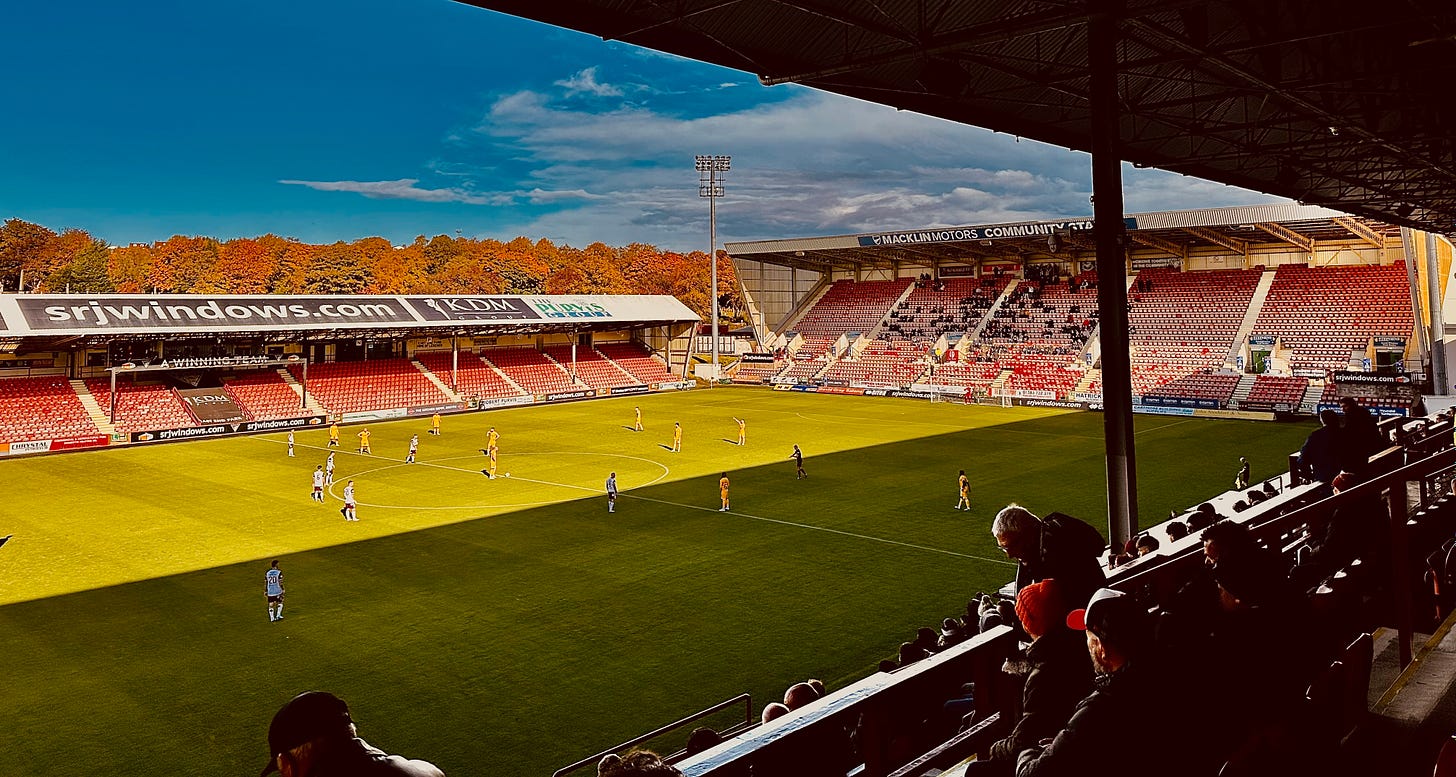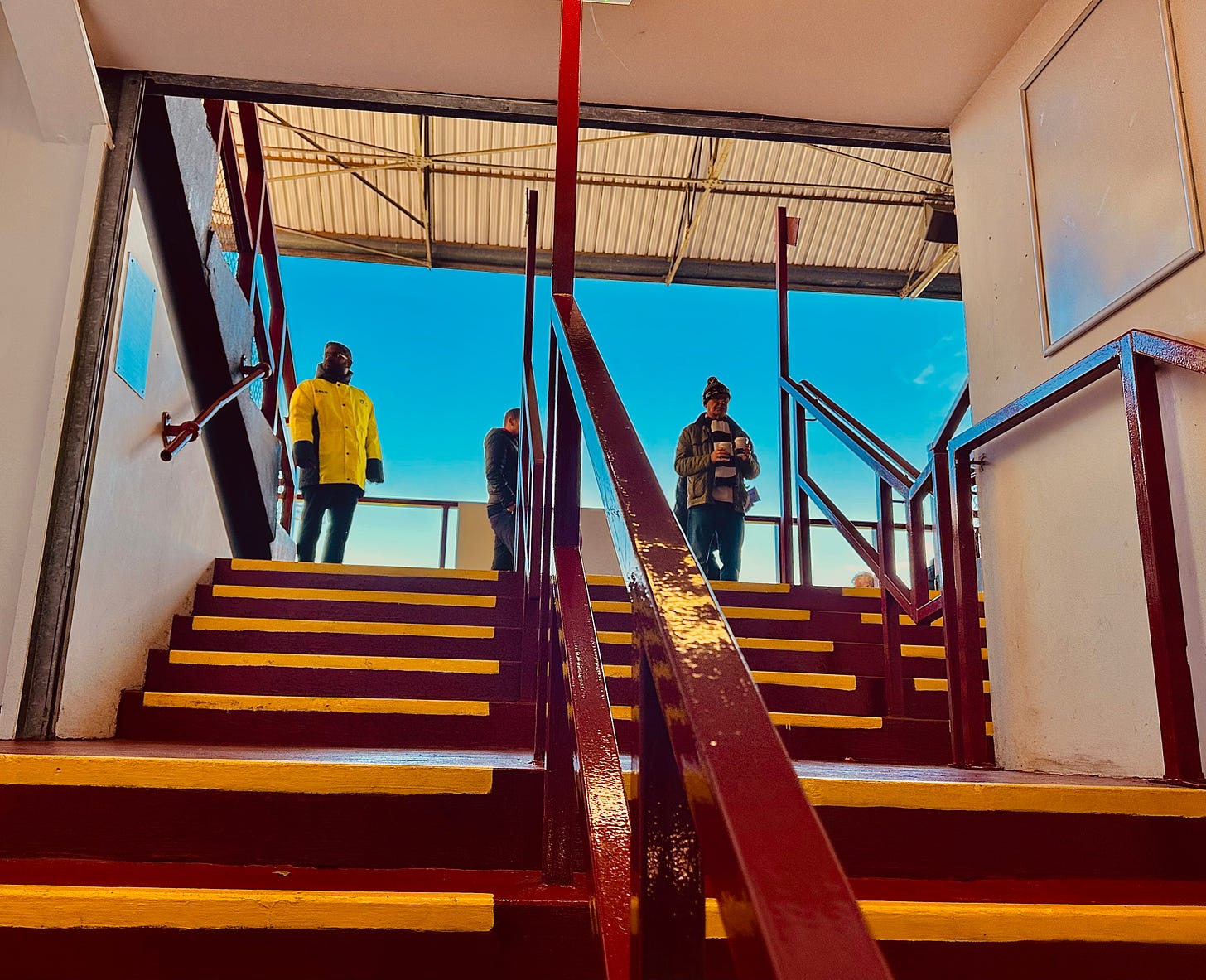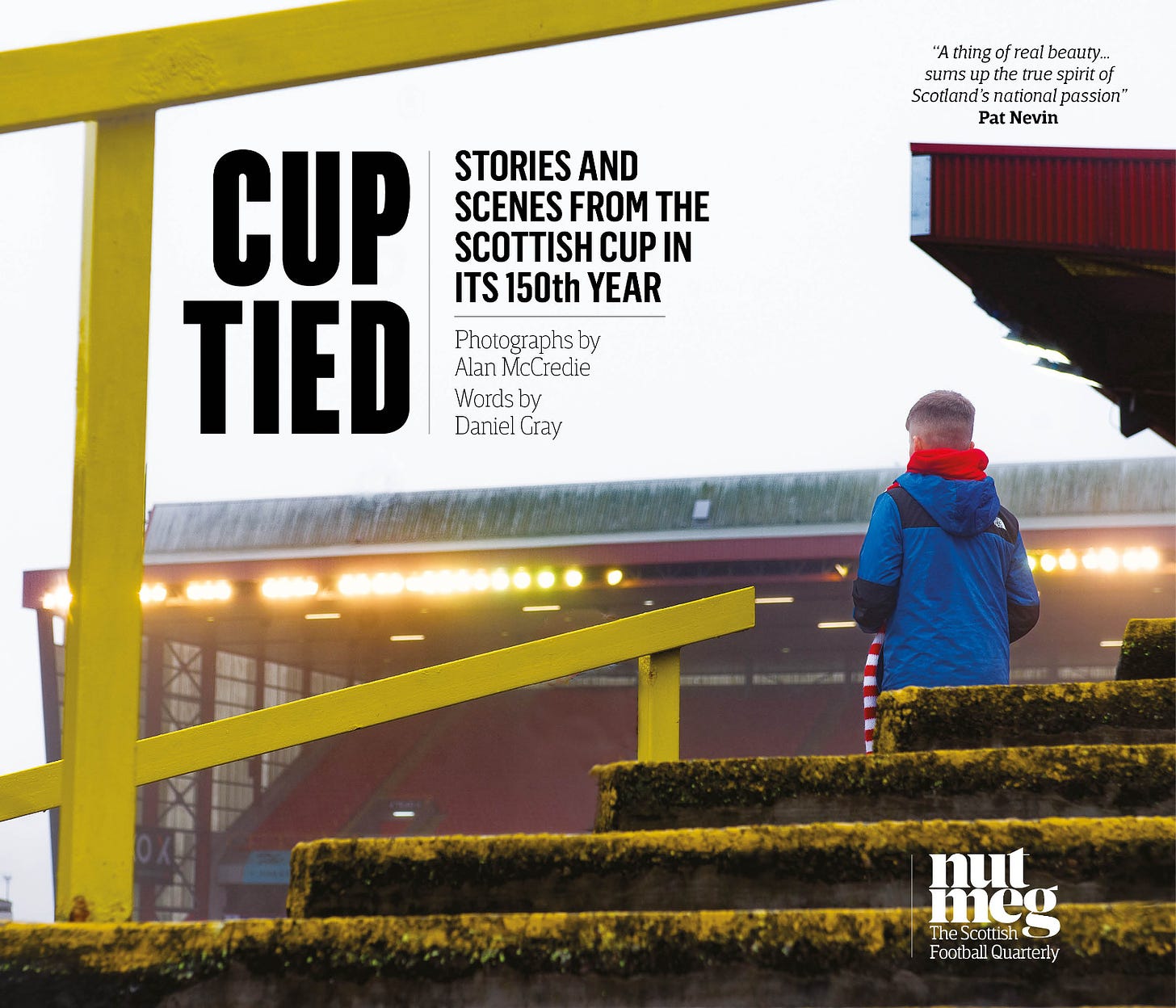The Slow Match Report: Dunfermline Athletic 2 Kelty Hearts 1
Fife's friendly rivals' Challenge Cup tie failed to deliver an upset on the park... but the fateful 'No Hot Food Left' sign provoked plenty off it
Down they came from old Kingdom coalfields, maroon day trippers in the capital of Fife. Ten times more people live in Dunfermline than do the retired mining village of Kelty. Those migrating six miles south for the day should logically have been doing so in expectation of a thorough hiding. Here were the grand old Pars, once of Europe, up against a club that resided in the Fife District League until 20 years ago.
Yet this is football and such conventions are rarely obeyed. Saturday’s lunchtime game was a cup tie, but in league matters only administrative boundaries separate the two clubs. Dunfermline are joint bottom of the Championship, and Kelty League One leaders. If the rascal upstarts of Fife football were not favourites ahead of the match, then they were at least well-liked.
There was confidence in the way their supporters moved down Halbeath Road on the way to East End Park. They seemed to stride while locals shuffled. Despite this, no friction could be detected. Any pretence of local rivalry fizzled out when the two groups encountered each other as home supporters queued at main stand turnstiles. Warm greetings were shared by men who knew each other from work. Teenagers of opposing colours nodded across. This was a geographic derby rather than one with any peppery hinterland. The mood was perhaps closer to that of a local meeting half a century ago, before footballing rivalries became so performatively acidic as they now are.
Behind me in one of those queues, a home fan fretted about time and team selection. “Seven minutes to 1pm. Seven! We’re gonna miss kick-off,” he remonstrated and, “Mehmet in goal again. I don’t like the sound of that.” The supporter was with his grandad and not yet 10-years-old. I worried about his future following the Pars. If he was this troubled and cynical now, what would he be like in 20 or 30 years’ time? The boy seemed to have bypassed those early golden years of wild optimism, skipped the middle period of rational support and gone straight to being someone actively contemplating contacting a radio phone-in.
The Skids’ Into the Valley croaked to life over the public address system and the two teams jogged onto the pitch. Dunfermline wore their away colours of all-yellow and Kelty theirs of white shirts with maroon sleeves, shorts and socks. The colour scheme complemented the magnificently autumnal trees that peeked over the North Stand opposite. Surely I wasn’t alone in thinking of conker fights.
Having won the toss, Kelty performed the footballing equivalent of dousing their conkers in vinegar or drying them in the airing cupboard: they changed ends. One man behind me booed and a number of people pursed their lips and let out whirring, ominous “Ooooh” sounds as if a Tarot reader had just turned over the Death card. This act remains to those who follow football the equivalent of spotting a lone magpie whilst walking under a ladder on Friday 13th. “I don’t like the look of this,” my dad used to agonise whenever it happened in front of us at Middlesbrough home fixtures, as if the game had already been lost.
Defying all of this deeply scientific reasoning, the Pars started well. Right-sided forward Dapo Mebude drilled forward, panicking the visiting defence. On the opposite wing, Kane Ritchie-Hosler did the same. Neither, though, could concoct an authentic threat on goal.
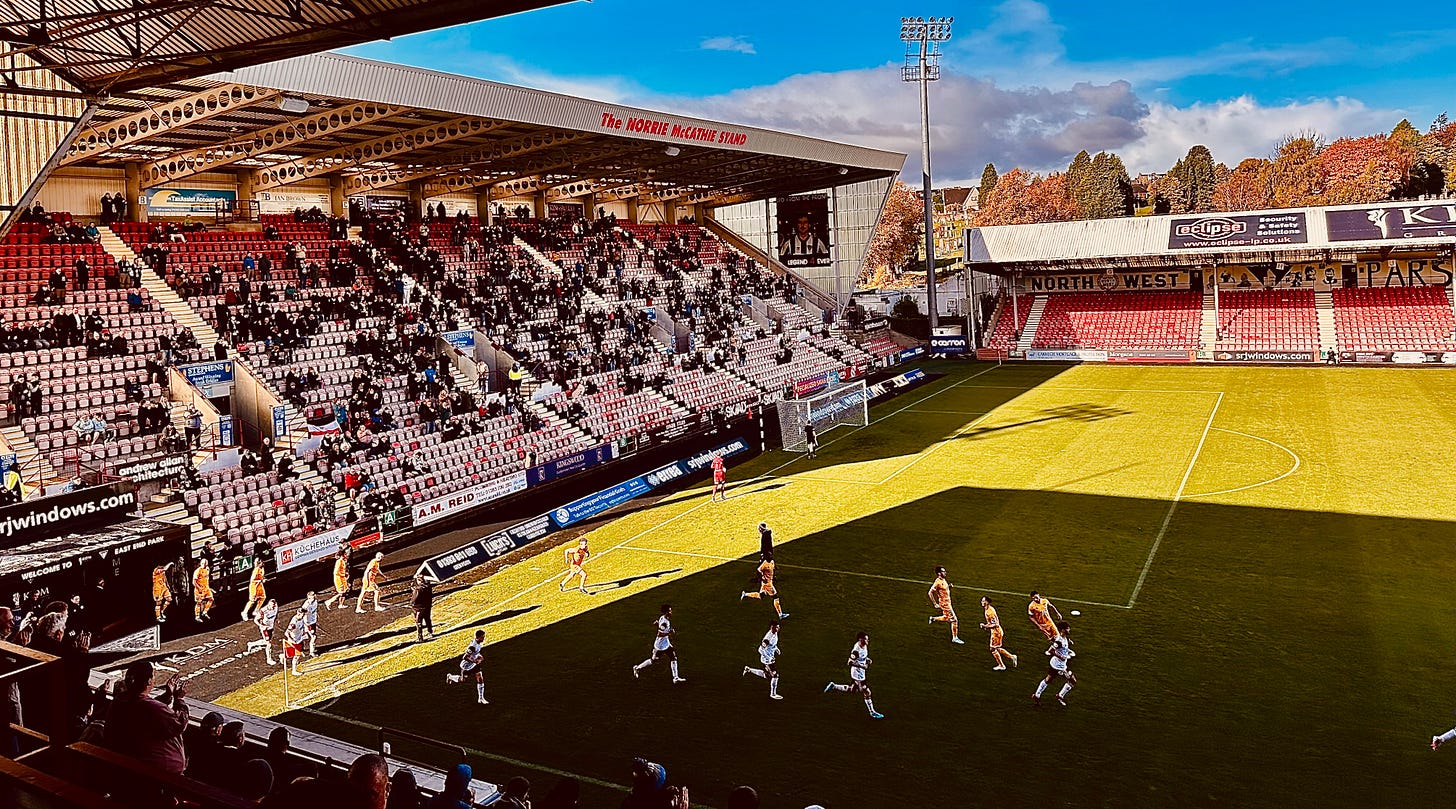
Kelty stumbled forward sporadically. One high cross summoned a double-fisted punch from Deniz Mehmet, nemesis of the young queue cynic. All around, Pars followers reacted with disgust, as if he had just asked each of them to drink a teacup of bin juice. “Just catch it!” they howled. It occurred to me that this was not merely a Dunfermline phenomenon; we never have quite taken to the goalkeeping punch, as if it were some fey Continental import unlike the good old wholesome British catch.
Beyond that eruption, in the stands gentle hubbub rather than noise reigned. This atmosphere was reflected on the pitch. Here was a shapeless match resembling the early shots in a pub pool game between two half-cut regulars. Then, bafflingly, a goal surfaced for Kelty. Midfielder Ross Cunningham pelted a shot goalwards, Mehmet made a fine save but Craig Johnston skewered the rebound home. The cup shock that wasn’t a shock, was on.
Then, quite quickly, it wasn’t. Eight minutes after Johnston’s opener, Matty Todd spiralled in a cross from which Chris Kane deftly scored with a flicked header. Another Pars goal followed when the team constructed a rare succession of passes as if suddenly remembering such things were possible. Todd himself finished the manoeuvre for 2-1.
At half-time, dreaded words were apparently muttered in the pie queue. “There’s no hot food left,” they seemed to say. At first, none of us believed them. Then, similar sentences began to drift along the line: “No hot food left… They’ve run out of hot food… There’s nae pies…” It was like the “Get Babyface” scene in Bugsy Malone, only with more swearing about absent pastry. Some left the queue, shaking their heads in disbelief. Others refused to accept these heinous tidings, remaining in place so that they might see with their own eyes the barren pie cabinet. This is, after all, the era of Fake News.
Still people arrived, their nostrils tantalised by the lingering vapours of departed pies. By now, the steward charged with breaking the news had sourced a fragment of cardboard box and written the hellish words ‘No Hot Food Left’ upon it in Biro. He held it up as a beggar might. Those approaching deciphered its message slowly, as if straining to read optical chart letters during an eye test. Perhaps they just did not want to think such things possible. Then rumour of a woman selling a spare pie swept among the rows. I returned to my seat and behind me another man settled back into position. “You’ll never guess what, Wullie,” he said to his friend, “There’s no fuckin’ pies left.”
We in the stands battled through in our famished state just as those on the pitch ran through a storm. The sky had turned the grizzly grey colour of a hard-living pigeon and begun to weep epic tears. On the iron main stand roof, it made the crackling static sound of an old radio being tuned between stations. A gutter began to leak, gushing with ferocity. At one point, it seemed to follow the linesman’s sideways shuffles, aping a cloud in a cartoon. “Four seasons in one day, Wullie,” said the man behind me, “and all o’ them shite.”
With their sodden shoulders hunched, the players attempted to provide some distraction but again the game descended into an unsolvable riddle. Pars’ full-back Ewan Otoo stood out in his determination to defy conditions. One rasping shot between the raindrops in particular reminded us that football remained possible. Then David Wotherspoon came on and the clouds stopped blubbing. It was as if they wished to witness his rare majesty for themselves – one sumptuous outside-boot pass travelled with the wondrous curvature of spaghetti hurled at a wall; then there was a turn in which he seemed to spin like a cat chasing its own tail. Wotherspoon did also pass the ball out of play at one point, but perhaps if those things didn’t happen then we here might never have had the ample pleasure of watching him play.
In the final few minutes Kelty pressed forward, albeit with the weak glow of a failing lightbulb. One hoisted ball elicited another punched clearance from Mehmet. “Right!” came the cry from behind, “I’ve had enough, Wullie. I’m away intae town for a pie.”
Enjoy Daniel’s writing? On October 24, Nutmeg - in partnership with award-winning publishers BackPage Press - are bringing out a photo essay book by Daniel and photographer Alan McCredie. In this elegant print documentary, the two follow the 150th year of the Scottish Cup (across season 2023-24) from hamlet to Hampden


